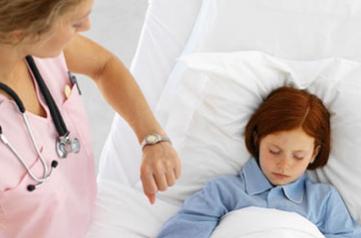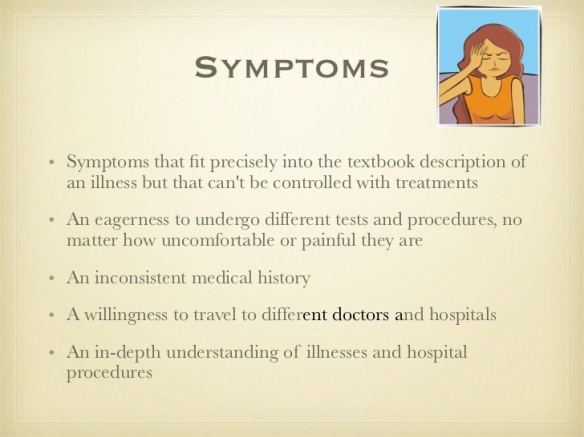
Factitious disorder (also known as Munchausen's syndrome) is a psychiatric disorder, in which a patient repeatedly behaves as though he has some sort of physical, psychological or cognitive disorder even when, in reality, he or she is not causing the symptoms. It is believed that almost half of the cases of factitious disorder involve children and adolescents.
The symptoms can be so severe that they may interfere with the functioning of a patient's mind and body
Children as young as three may be exhibiting these symptoms. Many patients do not seem to understand that they are being manipulated or even notice that the things happening around them are not real.
Children, of course, do not have the ability to recognize what is going on around them. They do not know that their behavior is inappropriate and are usually not aware of the fact that they are being manipulated. This explains why the condition is often misdiagnosed as a behavioral issue. In some cases, patients also tend to blame themselves for the condition. Since they are unaware that they are being manipulated, the doctors often prescribe antidepressants to these patients.
Patients of factitious disorder also have a tendency to experience changes in their appearance. This can include the change in clothing and hairstyle. They may also change how they eat. Some patients also complain about having "hair loss". While this does occur in many people, the severity of this type of condition can cause significant hair loss in the patient.
Doctors may use a variety of different methods to diagnose a patient of factitious disorder. One common method is by conducting interviews with the patient. Another method is to use x-rays to determine whether or not the patient has certain injuries or problems that may affect the ability to think properly. When these types of interviews and x-ray examinations reveal possible signs that may indicate a potential problem, the doctor will usually perform tests to determine if these are the cause of the problems.
A physical examination is also one of the ways that doctors determine if the patient has this disorder. X-rays can sometimes show minor abnormalities in the brain that can indicate problems with thinking. or behavior. Some of these abnormalities are visible at an early age and can lead to other problems.

When the patient is under observation, he or she may be asked to demonstrate various behaviors such as speaking and writing in an elaborate language. or in a very formal manner. This can be done in front of a mirror. This allows the doctor to look at the child's brainwaves to see if there are any abnormalities.
There is some debate about whether or not there is a difference between the causes of the conditions of the two types
Many doctors believe that the condition is an autoimmune problem, while others believe that it is genetic in nature. No definite cause has been found to date, although doctors do agree that the cause must be determined.
The treatment of Munchausen syndrome involves helping the patient to recognize and deal with the symptoms of the disorder. These symptoms include the sudden change in the way that they act. The most common symptom is that the child may suddenly become very interested in one activity and may become overly friendly or affectionate toward that activity.
In addition, many children who suffer from Munchausen Syndrome will also complain of not being able to concentrate or remembering things properly. These children are often known to be easily distracted, and to have problems with memory retention. This is considered to be a cognitive issue, but doctors are not sure exactly how the disorder can be caused.
Many children with this condition are treated using antipsychotic drugs. Children with this disorder have often been hospitalized due to this side effect. Other medications have been prescribed for this type of condition. The medication used in treating Munchausen Syndrome can cause a wide range of side effects, including weight gain, muscle and joint pain, vomiting, nausea, diarrhea, and excessive sweating.
In some rare cases, children have even been diagnosed with Tourette's Syndrome, a condition that involves the uncontrollable or abnormal use of language. Children with Tourette's Syndrome frequently have some sort of speech disorder. Most children who suffer from this condition do not go on to lead difficult lives and end up living normal lives after the disease has been treated.

